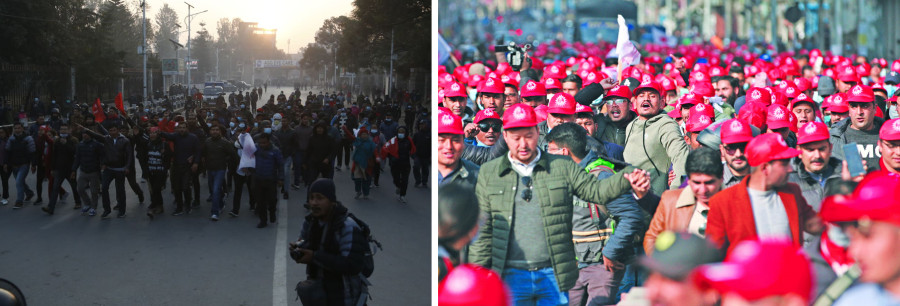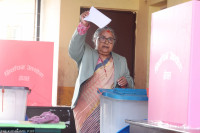Politics
Confrontational politics could lead to uncertainty and instability
The way Nepal Communist Party factions are at each other’s throat bodes ill for all, analysts say
Tika R Pradhan
The Pushpa Kamal Dahal-Madhav Kumar Nepal faction of the Nepal Communist Party had been taking to the streets for the last one and a half months, organising demonstrations and mass gatherings in various parts of the country, including the Capital, to protest against Prime Minister KP Sharma Oli’s House dissolution move.
Then on Wednesday, the Dahal-Nepal faction decided to call a general strike for Thursday, prompted by appointments of 32 individuals to 11 constitutional bodies.
Despite criticism of and opposition to the form of protest they chose, which was known as “Nepal banda” when the country was going through political upheaval and instability, the Dahal-Nepal faction went ahead with their general strike.
Arson, arrests and vandalism were reported.
The general strike on Thursday was called just a day before the Oli-led Nepal Communist Party is holding a mass gathering in Kathmandu.
Later in the day, the Oli faction organised its own rally intended at not only defying the Dahal-Nepal faction’s general strike but also at making an appeal to the people to join Friday’s mass gathering at Durbar Marg.
Reports of clashes and scuffles between the two factions filtered in from various districts throughout the day.
“The two factions of the Nepal Communist Party now are clearly in a confrontational mode,” said Krishna Pokhrel, a professor of political science at Tribhuvan University. “Today’s strike is the result of bulldozing the appointments to constitutional bodies, and the Oli faction is surely going to react in an aggressive manner [tomorrow].”
After months-long crisis in the Nepal Communist Party, born out of a merger between Oli’s CPN-UML and Dahal’s Maoist Centre in May 2018, Oli on December 20, in a drastic and unexpected move, dissolved the House of Representatives. He has called snap polls for April 30 and May 10.
Five days before he dissolved the House, Oli on December 15 introduced an ordinance to amend the Constitutional Council Act and the same day, a meeting of the Council, which he heads, recommended 38 individuals for various constitutional bodies.
Oli’s ordinance and House dissolution moves are sub judice in court.
As many as 13 writs against the House dissolution move are being heard by the Constitutional Bench. Not even a single hearing has been conducted for the writs against Oli’s ordinance move as of now. But President Bidya Devi Bhandari went on to appoint them to their respective posts and 32 individuals were administered the oath of office and secrecy on Wednesday.
The appointments are seen as Oli’s one more bid to wield control over key constitutional bodies which are meant to keep the government in check.
Analysts say while Oli has turned Nepali politics murky, the Dahal-Nepal faction is doing no good. At a time when the country is expecting some sanity to prevail, both factions are baying for each other’s blood in such a way that they could throw the country into the abyss of an unending uncertainty, according to them.
“Oli by now has proved himself to be a reckless leader,” said Lokraj Baral, a former professor of political science at Tribhuvan University who also served as Nepal’s ambassador to India from 1996 to 1997. “When he should have been pulled up for his wrongdoings, the other faction is resorting to a general strike, which will only provoke the Oli faction.”
The Oli and Dahal-Nepal factions are already in a legal dispute over the legitimacy of the party, as both of them are claiming the Nepal Communist Party as their own.
Elections are less than three months away if the court decides to uphold Oli’s House dissolution. Observers wonder how nasty the confrontation could turn in the lead up to the elections.
If the court overturns Oli’s decision, politics will return to Parliament and within the constitutional framework. But with the Nepal Communist Party divided, the country is likely to see a hung parliament.
Streets protests and parties calling out each other could be the order of the day, according to observers.
“It has by now become apparent that the two communist forces will head for confrontations, which is evident from their actions so far,” said Baral. “We are in for uncertainties.”
Incendiary statements are already flying between the leaders of the two factions.
The Oli faction seems to have comparatively more organised groups with Mahesh Basnet, one of his confidantes, leading one such group that is on the forefront of not only organising the mass gatherings but also making inflammatory speeches.
“I would like to tell them [Dahal-Nepal faction] not to dare interfere with our rallies on Friday,” said Basnet while addressing a counter-rally in Kathmandu on Thursday.
On Wednesday also, the Oli faction’s youth wing had organised a motorcycle rally in Kathmandu.
“Oli has surpassed king Gyanendra in using all the wings under his faction to provoke parties and the society,” Khimlal Devkota, a central member of the Dahal-Nepal faction. “We have been protesting peacefully against his House dissolution move, as we have the constitutionally guaranteed right to express our dissent.”
But the Dahal-Nepal faction’s Thursday protest did not go well. Some demonstrators set a taxi on fire and vandalised some vehicles. Many complained of inconvenience caused by the sudden general strike which was announced less than 24 hours ago.
Police rounded up around 100 cadres of the Dahal-Nepal faction.
The Dahal-Nepal faction, however, blamed the “other side” for torching the taxi so as to provoke the situation.
“Yes, confrontations are very much likely, but it’s all because of Oli. Incidents like torching of taxis early in the morning seem to be aimed at fuelling conflict,” said Devkota. “Oli is preparing grounds to impose a state of emergency, as he is getting weaker and his government is facing a legitimacy crisis.”




 27.41°C Kathmandu
27.41°C Kathmandu













